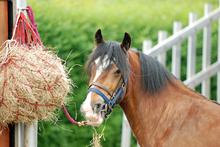SmartPak urges horse owners to consider the natural way horses graze: "Your horse was designed to spend his days roaming and grazing, thriving on the nutrients found in fresh grass. "

A more natural way of feeding horses
The benefits of constant grazing are plentiful, but acres of fresh pasture can be hard to come by, especially in the winter. Luckily, there are ways that you can help your horse get the benefits of grazing even when your fields are barren.
"The benefits of constant grazing are plentiful, but acres of fresh pasture can be hard to come by, especially in the winter. Luckily, there are ways that you can help your horse get the benefits of grazing even when your fields are barren."
Digestive Health
"Your horse’s digestive system evolved to rely on a slow, steady intake of complex carbohydrates, like grasses. If he isn’t constantly grazing, his risk for ulcers and colic increases. If your horse can’t have access to fresh pasture due to geographic limitations or health conditions, at least make sure you’re providing plenty of quality hay throughout the day (free choice is ideal, but be sure to check with your veterinarian). "
SmartPak recommends the use of a "slow feed" hay bag or net so horses ingest forage slowly.
Joint & Hoof Health
"The constant mobility that comes with grazing is beneficial for both your horse’s joint health and his hoof circulation (learn more at SmartPak.com/HoofCirculation). If you can’t provide acres of turnout in the winter due to inclement weather, try to make sure your horse is getting as much exercise as possible, whether it’s handwalking, turnout in the indoor, or a few extra hacks a week from a friend."
Nutrition
"Fresh pasture and hay are both forages, but they’re not created equal. Grass contains key nutrients like omega 3 fatty acids and vitamins A and E, but those nutrients are reduced when it is cut, dried, and stored as hay".
"Omega 3 fatty acids are essential to your horse’s well-being because they help support cellular health and a normal response to inflammation. If your horse doesn’t graze on fresh pasture year-round, consider supplementing with SmartOmega 3 Ultra. This formula provides omega 3 fatty acids from flax seed, fish oil, and chia seed, as well as vitamins A and E."
See Grazing without the Grass for complete information.
